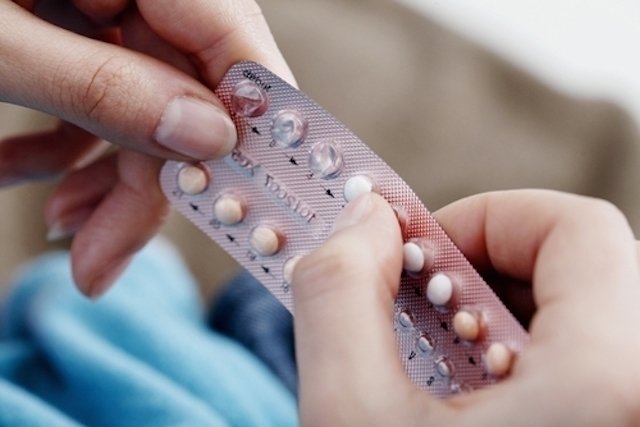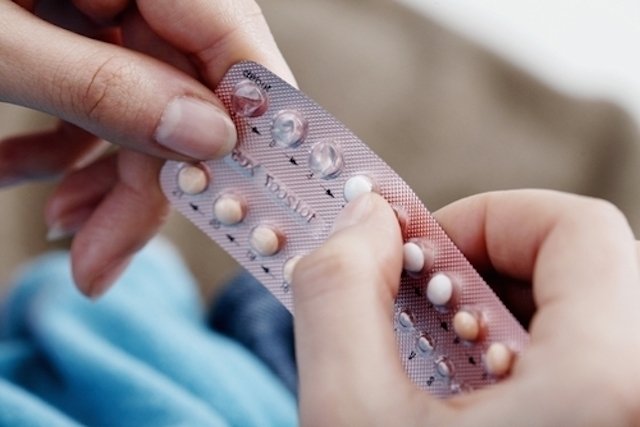Although the risk is small, it is possible to get pregnant while taking birth control. When taken correctly, the risk of pregnancy is less than 1 in 100 women in the first year of use.
Birth control pills contain hormones that act to prevent ovulation and, therefore, prevent pregnancy. However, if a woman forgets to take contraceptives or uses certain medications, such as some antibiotics and anticonvulsants, for example, the effect of the pill may be impaired, increasing the risk of becoming pregnant.
Therefore, it is important to consult a gynecologist before starting to use any contraceptive so that the best method can be indicated for each woman. Furthermore, if pregnancy is suspected, even if you are taking contraceptives, it is recommended to take a pregnancy test. See how and when to take the pharmacy pregnancy test.

What increases the risk of getting pregnant
The risk of getting pregnant while taking contraceptives increases if:
1. Forgetting to take a day
Forgetting to take your birth control pill one day can increase your chances of getting pregnant because hormone levels in your body can fluctuate, increasing your risk of ovulating.
What to do: If a woman forgets to take a pill, it is recommended to take it as soon as she remembers and then take the next pill at the usual time. Furthermore, it may be recommended to use an additional contraceptive method, such as a condom, for example, during the next 7 days. Find out what to do if you forget to take your contraceptive.
2. Not taking it at the right time
It is important to always take the contraceptive at the same time to avoid variations in hormone levels in the body, which can increase the risk of ovulating and the chances of getting pregnant.
What to do: Some tips for taking the pill at the right time include setting a wake-up clock, a reminder on your cell phone or creating a habit of taking the pill with a specific daily activity, such as during lunch or dinner, for example.
Additionally, if you forget to take your contraceptive at the same time every day, you may be advised to use an additional method of contraception for the next 7 days.
3. Having episodes of diarrhea or vomiting
Having episodes of diarrhea or vomiting within 3 to 4 hours of taking the contraceptive pill or for more than 48 hours can reduce the absorption of the pill, increasing the risk of becoming pregnant.
What to do: If the contraceptive is progesterone only and vomiting or diarrhea occurs within 3 hours of taking the medication, it is recommended to take another pill as soon as possible. In addition, you should continue taking the contraceptive at the usual times and use another contraceptive method within 2 days after symptoms improve.
As for contraceptives containing estrogen and progesterone, in case of vomiting or diarrhea, it is usually recommended to continue taking the medication at the usual times. Furthermore, if symptoms last more than 48 hours, it is recommended to use another contraceptive method until you are free from vomiting or diarrhea for 7 days in a row.
4. Forgetting to take it several times
Forgetting to take the contraceptive pill several times during the month does not allow for an effective contraceptive effect, greatly increasing the risk of pregnancy.
What to do: It is important to use another contraceptive method, such as condoms, for example, throughout the use of the contraceptive pack until starting a new one.
Furthermore, it is important to consult your gynecologist about the possibility of changing contraceptives to other methods, such as contraceptive injections, hormonal patches, and IUDs, for example, which do not require daily reminders.
5. Switch contraceptives
It is important to be careful when changing contraceptives because each one has its own characteristics and method of use. Additionally, the switch can affect hormone levels in the body, increasing the risk of ovulation.
What to do: It is important to consult a gynecologist to change contraceptives safely. Furthermore, it is generally advised to use condoms for the first 2 weeks when changing contraceptives. See how to change contraceptives without running the risk of getting pregnant.
6. Using other remedies
Some antibiotics, such as rifampicin and rifapentine, and certain anticonvulsants, such as phenobarbital, carbamazepine and topiramate, can interfere with the effectiveness of contraceptives by reducing or cutting their effect.
What to do: It is recommended to talk to the doctor responsible for the treatment to avoid interactions that interfere with the use of contraceptives. Furthermore, in some cases the use of other contraceptive methods may be indicated.
7. Drinking alcoholic beverages
Alcohol does not directly interfere with oral contraceptives, however, when drinking there is a greater risk of forgetting to take the pill, which can reduce its effectiveness and increase the risk of an unwanted pregnancy.
Furthermore, if you drink a lot before taking the contraceptive and vomit up to 3 or 4 hours after taking the pill, it can reduce the effectiveness of the contraceptive.
What to do: It is recommended to avoid excessive alcohol consumption when using oral contraceptives, so as not to forget to use the medication at the right times and avoid symptoms such as nausea and vomiting, which can interfere with the effect of the contraceptive.
8. Not storing contraceptives correctly
It is important to keep the pill in its original packaging, at the correct temperature and away from moisture to ensure that the pills do not undergo changes that could reduce their effectiveness and increase the risk of becoming pregnant.
What to do: Before using the pill, it is important to observe the appearance of the tablet and, if there is any change in color or smell, if it crumbles or appears wet, do not use the tablet. In these cases, it is important to buy another contraceptive pack.
Is it possible to get pregnant while taking the pill and breastfeeding?
Although the risk of getting pregnant is very small, it is still possible to get pregnant by taking the pill and breastfeeding. This risk tends to be greater after the first 6 months after birth, when breastfeeding is not the only source of food for the baby and when menstruation returns.
Furthermore, if the pill is not taken correctly or the woman uses medications such as some antibiotics and anticonvulsants, for example, its effect may be impaired. See which antibiotics cut the effect of contraceptives.
What is the chance of getting pregnant while taking birth control?
When taken correctly, the chance of getting pregnant while taking birth control is less than 1% in the first year. This means that less than 1 woman in 100 has a reduced risk of getting pregnant in the first year after starting birth control.
When used incorrectly, this risk can increase to 9 women in every 100.

Sign up for our newsletter and stay up to date with exclusive news
that can transform your routine!
Warning: Undefined array key "title" in /home/storelat/public_html/wp-content/plugins/link-whisper-premium/templates/frontend/related-posts.php on line 12
Warning: Undefined array key "title_tag" in /home/storelat/public_html/wp-content/plugins/link-whisper-premium/templates/frontend/related-posts.php on line 13




